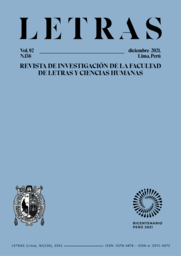Violence and Carribbean religation: Bicentenaire by Lyonel Trouillot
Abstract
Contemporary Haitian literature offers an interior vision of a very dynamic culture, which requires a constant aesthetic elaboration capable of offering lines of meaning that allow an approach to its complexity. This work analyzes the novel by the Haitian writer Lyonel Trouillot Bicentenaire (2004). This is an author who has developed all his extensive literary career, still growing, within the country, which is not a minor fact given there are colleagues from Haiti who, because they reside abroad, have had the benefit of more media circulation. The text that concerns us fictionalizes the day of protests that took place in Port-au-Prince on January 1, 2004 —the date on which the bicentennial of the declaration of Haitian independence is commemorated— against President Jean Bertrand Aristide, who finally leaves the power a few days later. However, our interest consists in examining intertextual links of a very varied discursive treatment with Caribbean texts (songs performed by Bob Marley, the novel Crónica de una muerte anunciada by Gabriel García Márquez and the drama Une tempête by Aimé Césaire as a re-asserting strategy that seeks to inscribe the problem of violence in the larger context of the culture of the Caribbean, whose heterogeneity does not prevent the verification of common dynamics that Trouillot’s text seeks to relate from the references to other texts.Downloads
Métricas alternativas
References
Aiello, F. (2013). Los usos de Toussaint Louverture: relecturas de la historia haitiana en la obra de Aimé Césaire. Estudios. Revista de Investigaciones Literarias y Culturales, 41, 93-113.
Bonfiglio, F. (2013). Una Tempestad (1969) de Aimé Césaire: Una reescritura, varios pretextos. Estudios. Revista de Investigaciones Literarias y Culturales, 41, 137-163.
Césaire, A. (2011 [1969]). Una tempestad (edición bilingüe). Trad. Ana Ojeda. Buenos Aires: El 8vo. Loco.
Fernández Andrade, E. M. (2017). El auge del narcotráfico en Haití y la guerra (fallida) contra las drogas. Forum, 12, 9-30.
Fernández Andrade, E. M. (2019, 9 de mayo). Narcotráfico, núcleo de la corrupción que mantiene crisis social histórica en Haití. Un periódico digital (Universidad Nacional de Colombia). https://unperiodico.unal.edu.co/pages/detail/narcotrafico-nucleo-de-la-corrupcion-que-mantiene-crisis-social-historica-en-haiti/.
García Márquez, G. (1993 [1981]). Crónica de una muerte anunciada. Buenos Aires: Norma.
Hale, T. (1973). Sur “Une tempête” de Aimé Césaire. Études littéraires, 6 (1), 21-34.
Hoffmann, L-F. (2010). Haïti : regards. París: L’Harmattan.
Hurbon, L. (1987). ComprendreHaïti. Karthala, Henri Deschamps.
Kristeva, J. (1981). Semiótica I. Madrid: Fundamentos.
Paulémont, W. (2020). La carte de confinement de Lyonel Trouillot [Video]. Direction Nationale du Livre. https://www.facebook.com/Direction-Nationale-du-Livre-DNL-193436157479337/videos/190804678881730/.
Price-Mars, J. (2009 [1928]). Ainsi parla l’oncle. Suivi de Revisiter l’Oncle. Montreal: Mémoire d’encrier.
Sánchez Hernández, C. (2010). Haití, Aristide, y la política exterior y militar de Estados Unidos (1990-2010). Nómadas. Critical Journal of Social and Juridical Sciences, 25(1). https://www.redalyc.org/pdf/181/18112179004.pdf.
Stowe, H. B. (1994). Uncle Tom’s Cabin. Ed. Elizabeth Ammons. Nueva York: Norton.
Trouillot, L. (2004). Bicentenaire. París: Babel.
Zanetti, S. (1994). Religación. Un modo de pensar la literatura latinoamericana. El Dorado, 1(1), 5-8.
Copyright (c) 2021 Letras (Lima)

This work is licensed under a Creative Commons Attribution 4.0 International License.
Este obra está bajo una licencia de Creative Commons Reconocimiento 4.0 Internacional



















